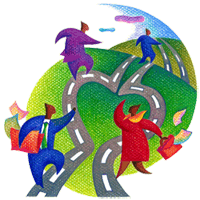What does the statement “all capitalism is crony capitalism” is referring to? Do you agree with this statement or not? Give an example.
The statement “all capitalism is crony capitalism” refers to the alliances made by the companies and the government affecting directly the development of the market. Those companies are the ones that have more advantages over the market providing to the government a lot of profits and benefits. I think that sometimes the government takes advantages of this, where they can manipulate the market for their convenience. I think the government sometimes abuses from its power and can affect us in damaging ways. An example was when Wall-mart in order to enter the Chinese market had to do an alliance with a Chinese company owned by officials.
What is a banana republic? Why the author is comparing India with a banana republic?
Banana Republic refers to a country that deals a lot with crony capitalism and corruption also it is a country that bases its economy on agriculture. The author explains how Mr. Tata warn us against becoming a banana republic because banana republic’s run on cronyism and that things are not good for people with lesser power in such states. This will create an unstable country where the rich will become richer and the poor ones will become poorest
Why is it problematic that in the business world “The Media” becomes a corporation?
The media can create a great unbalance in society affecting each aspect of it. It has a great power and influence everywhere and on everything, real state, mining, hotels, banks, even into private treaties with other corporations in whom they acquire a stake. Now day’s media is not very impartial, sometimes media shows things at their convenience. This is way we could say that if media becomes a corporation it will create an unbalance giving some power to others at their convenience affecting societal equilibrium and justice.
In this situation, what behaviors are considered unethical for corporations, journalist and the state?
ü Corporations: manipulation to the media, corruption and their selfish attitude to the world.
ü Journalists: their unethical behavior in order to get more credits bypassing the social welfare (un-neutral position); how they are influenced by people with more power just because their convenience and the lies they made up when broadcast information.
ü State: people involved in this field are selfish and corrupt. They care more about their welfare than the others welfare.
What can The Media, Corporations and the States do in order to behave ethically and in the benefit of the people and not their own interest. Give at least 5 good ideas.
1. The media can act in an impartial way, being fair and not damaging reputations, showing real and truth facts.
2. Corporations should have a better emphasizes on social responsibility, providing the society benefits. Being honest and not selfish.
3. Corporations should organize and restructured their objectives or goals in order to direct them to the welfare of society.
4. State should focus more on the welfare of each individual than to the welfare of corporations. Eliminating the corruption.
5. State should be less corrupt and more transparent. Provide more benefits to society trough social programs. Think first in society and them in themselves.










